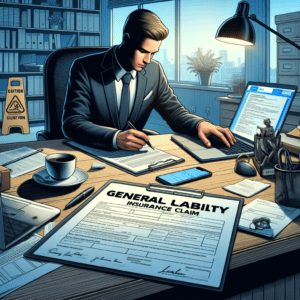
What Is General Liability Insurance?
General liability insurance (also known as commercial general liability or CGL) is a crucial aspect of risk management for businesses and individuals alike. It provides protection against potential financial losses resulting from claims of bodily injury, property damage, or personal injury caused by the insured party.
Without this coverage, businesses and individuals may face significant financial risks and legal liabilities.
In this article, we will explore the importance of general liability insurance, who needs it, what it covers, how much it costs, and how to choose the right policy.
Key Takeaways
- General liability insurance is a type of insurance that protects businesses from financial loss due to lawsuits or claims made against them.
- It is important for businesses of all sizes and industries to have CGL to protect themselves from potential lawsuits and financial ruin.
- General liability covers a wide range of incidents, including bodily injury, property damage, and advertising injury.
- The cost of general liability insurance varies depending on factors such as the size of the business, the industry, and the coverage limits.
- To choose the right CGL policy, businesses should consider their specific risks and needs, as well as the reputation and financial stability of the insurance provider.
What is General Liability Insurance?
General liability insurance is a type of insurance policy that provides coverage for claims arising from third-party bodily injury, property damage, or personal injury. Its purpose is to protect businesses and individuals from potential financial losses resulting from lawsuits or legal claims.
This insurance coverage is essential because accidents can happen at any time, and the costs associated with legal defense and settlements can be substantial.
There are various types of claims covered by this insurance. These include slip and fall accidents, property damage caused by the insured party’s negligence, product liability claims, advertising injuries such as defamation or copyright infringement, and bodily injuries resulting from accidents on the insured premises.
By having a CGL policy in place, businesses and individuals can have peace of mind knowing that they are protected against these potential risks.
Why is General Liability Important?
The importance of general liability insurance cannot be overstated. Without this coverage, businesses and individuals may face significant financial risks that could potentially bankrupt them. Lawsuits can arise from various situations, such as a customer slipping and falling in a store, a product causing harm to a consumer, or an employee causing property damage while on the job.
The potential financial risks of not having general liability insurance are immense. Legal defense costs alone can be exorbitant, even if the lawsuit is ultimately dismissed or settled out of court. Additionally, if a judgment is awarded against the uninsured party, they may be responsible for paying damages, which can be financially devastating. General liability insurance provides a safety net, ensuring that businesses and individuals are protected from these potential financial burdens.
Who Needs General Liability Insurance?
| Who Needs General Liability Insurance? |
|---|
| Small business owners |
| Contractors and subcontractors |
| Landlords and property owners |
| Event planners and organizers |
| Manufacturers and distributors |
| Service providers |
| Non-profit organizations |
| Individuals who host events or parties |
General liability insurance is essential for various types of businesses and individuals. Any business that interacts with the public, whether through physical premises or the sale of products or services, should have this coverage.
This includes retail stores, restaurants, contractors, consultants, and healthcare providers, among others. Even individuals who engage in activities that could potentially cause harm to others, such as hosting events or offering services in their homes, should consider obtaining general liability insurance.
Certain industries may have a higher risk of liability claims due to the nature of their operations. For example, construction companies face risks associated with property damage and bodily injury on job sites. Healthcare providers may face claims related to medical malpractice.
It is crucial for businesses in these industries to have adequate general liability insurance coverage to protect themselves from potential lawsuits and financial losses.
What Does General Liability Cover?

General Liability Insurance Legal Protection
General liability insurance covers a wide range of claims that may arise from the insured party’s actions or operations. These claims include bodily injury, property damage, personal injury, and advertising injury.
- Bodily injury claims can result from accidents on the insured premises or injuries caused by the insured party’s products or services.
- Property damage claims cover damage to third-party property caused by the insured party’s negligence.
- Personal injury claims encompass non-physical harm caused by the insured party, such as defamation or invasion of privacy.
- Advertising injury claims arise from allegations of copyright infringement, false advertising, or slander. It is important to note that general liability insurance typically has limits of coverage and exclusions.
It is essential to review the policy carefully to understand what is covered and what is not.
How Much Does General Liability Insurance Cost?
The cost of general liability insurance varies depending on several factors. These include the type of business or individual seeking coverage, the industry they operate in, the coverage limits desired, and the location of the insured party. For example, a small retail store may pay a lower premium compared to a construction company due to the difference in risk exposure.
To provide some context, let’s consider a few examples:
- A small retail store with $1 million in coverage may pay an annual premium of around $500 to $1,000.
- A contractor with $2 million in coverage may pay between $1,000 and $3,000 per year.
These figures are estimates and can vary significantly based on individual circumstances. It is advisable to obtain quotes from multiple insurance providers to compare costs and coverage options.
How to Choose the Right Policy?
Choosing the right policy is crucial for businesses and individuals to ensure they have adequate coverage for their specific needs. It is essential to consider factors such as the nature of the business or activities, the level of risk exposure, and the desired coverage limits. Here are some tips for selecting the best policy:
- Assess your risk exposure: Understand the potential risks associated with your business or activities. Consider factors such as the number of employees, the type of products or services offered, and the location of operations.
- Evaluate coverage options: Review different policy options and compare their coverage limits, exclusions, and endorsements. Ensure that the policy covers the specific risks you face.
- Consider additional endorsements: Depending on your industry or specific needs, you may require additional endorsements or specialized coverage. For example, professional liability insurance may be necessary for certain professions.
- Research insurance providers: Look for reputable insurance providers with a track record of excellent customer service and prompt claims handling. Read reviews and seek recommendations from trusted sources.
- Seek professional advice: If you are unsure about which policy is best for your needs, consider consulting with an insurance broker or agent who specializes in general liability insurance. They can provide expert guidance and help you navigate the complexities of insurance policies.
What are the Risks of Not Having General Liability?
The risks of not having general liability can be severe and potentially catastrophic for businesses and individuals. Without this coverage, they may be exposed to significant financial and legal liabilities. Lawsuits can arise from various situations, such as accidents on the insured premises, injuries caused by products or services, or allegations of defamation or copyright infringement.
The financial risks associated with lawsuits can be overwhelming. Legal defense costs alone can quickly escalate, even if the lawsuit is ultimately dismissed or settled out of court. If a judgment is awarded against the uninsured party, they may be responsible for paying damages, which can result in bankruptcy or severe financial hardship. It is crucial to recognize that even baseless claims can result in substantial legal expenses, making general liability insurance an essential safeguard.
There have been numerous cases where businesses faced lawsuits without insurance and suffered significant financial consequences:
For example, a small restaurant without general liability insurance may face a lawsuit from a customer who slipped and fell on a wet floor, resulting in serious injuries. The costs associated with legal defense and potential damages could easily bankrupt the business. Having general liability insurance in place would have provided the necessary protection to mitigate these risks.
How to File a General Liability Insurance Claim?

How to File a General Liability Insurance Claim?
Filing a general liability insurance claim involves several steps to ensure a smooth and efficient process. Here is a general overview of the claim filing process:
- Notify your insurance provider: Contact your insurance provider as soon as possible after an incident occurs that may result in a claim. Provide them with all relevant details, including the date, time, location, and nature of the incident.
- Document the incident: Gather any evidence related to the incident, such as photographs, witness statements, or police reports. This documentation will help support your claim and provide evidence of the damages or injuries sustained.
- Cooperate with the investigation: Your insurance provider may conduct an investigation to assess the validity of the claim. Cooperate fully and provide any requested information or documentation promptly.
- Keep records of expenses: Keep detailed records of any expenses related to the incident, such as medical bills, repair costs, or legal fees. These records will be essential when seeking reimbursement from your insurance provider.
- Follow up with your insurance provider: Stay in regular communication with your insurance provider throughout the claims process. Ask for updates on the status of your claim and provide any additional information or documentation as requested.
It is important to note that the specific claim filing process may vary depending on the insurance provider and policy terms. It is advisable to review your policy carefully and contact your insurance provider for detailed instructions on how to file a claim.
What to Look for in an Insurance Provider?
Selecting a reputable and reliable CGL provider is crucial to ensure that you receive the coverage and support you need in times of crisis. Here are some factors to consider when researching and selecting a provider:
- Financial stability: Look for insurance providers with a strong financial rating from reputable rating agencies. This indicates their ability to meet their financial obligations and pay claims promptly.
- Claims handling reputation: Research the insurance provider’s reputation for claims handling. Read reviews and seek recommendations from other policyholders to gauge their level of customer service and responsiveness.
- Coverage options: Ensure that the insurance provider offers coverage options that align with your specific needs. Consider factors such as coverage limits, endorsements, and additional specialized coverage options.
- Customer service: Evaluate the insurance provider’s customer service capabilities. Consider factors such as accessibility, responsiveness, and the availability of dedicated claims representatives.
- Price competitiveness: While price should not be the sole determining factor, it is essential to compare premiums from different insurance providers to ensure you are getting a competitive rate for the coverage offered.
- Policy terms and conditions: Carefully review the policy terms and conditions to understand the coverage limits, exclusions, and endorsements. Ensure that the policy aligns with your specific needs and risk exposure.
How to Reduce Your Premiums?

Risk Management Practices
Reducing the cost of general liability premiums can help businesses and individuals manage their expenses while still maintaining adequate coverage. Here are some strategies for reducing premiums:
- Implement risk management practices: Insurance providers often offer premium discounts for businesses or individuals that have implemented risk management practices. This may include safety training programs, regular equipment maintenance, or security measures.
- Increase deductibles: Consider increasing the deductible amount on your general liability insurance policy. A higher deductible means a lower premium, but it also means you will be responsible for a larger portion of any claims.
- Bundle policies: Some insurance providers offer discounts for bundling multiple policies together, such as general liability insurance, property insurance, and commercial auto insurance. Consolidating your policies with one provider can result in cost savings.
- Shop around for quotes: Obtain quotes from multiple insurance providers to compare costs and coverage options. This will help you identify the most competitive rates available in the market.
- Maintain a good claims history: Insurance providers consider your claims history when determining premiums. By maintaining a good claims history and avoiding frequent or large claims, you may be eligible for lower premiums.
It is important to note that while reducing premiums is desirable, it should not come at the expense of adequate coverage. It is crucial to strike a balance between cost savings and ensuring that you have sufficient protection against potential risks.
Frequently Asked Questions About General Liability Insurance
Is general liability insurance mandatory?
General liability insurance is not mandatory in most jurisdictions. However, many businesses and individuals choose to obtain this coverage to protect themselves from potential financial losses resulting from lawsuits or legal claims.
Does general liability cover professional mistakes?
No, general liability insurance typically does not cover professional mistakes or errors. Professional liability insurance, also known as errors and omissions insurance, is designed to cover claims arising from professional negligence or mistakes.
Can I cancel my policy?
Yes, you can typically cancel your general liability insurance policy at any time. However, it is important to review the terms and conditions of your policy to understand any cancellation fees or penalties that may apply.
Can I add additional insureds to my policy?
Yes, many general liability insurance policies allow for the addition of additional insureds. This is common when businesses or individuals need to provide proof of insurance coverage to clients or business partners.
Does general liability insurance cover cyber liability?
No, general liability insurance typically does not cover cyber liability claims. Cyber liability insurance is a separate type of coverage that protects against losses resulting from data breaches, cyberattacks, or other cyber-related incidents.
Conclusion
In conclusion, general liability insurance is a vital component of risk management for businesses and individuals. It provides protection against potential financial losses resulting from claims of bodily injury, property damage, or personal injury caused by the insured party. Without this coverage, businesses and individuals may face significant financial risks and legal liabilities that could potentially bankrupt them.
It is crucial for businesses and individuals to understand the importance of general liability insurance and ensure they have the right coverage in place. By assessing their risk exposure, evaluating coverage options, and selecting a reputable insurance provider, they can protect themselves from potential lawsuits and financial losses.
Take action today to protect yourself with the right general liability insurance coverage. Don’t wait until it’s too late – the peace of mind and financial security it provides are invaluable.





